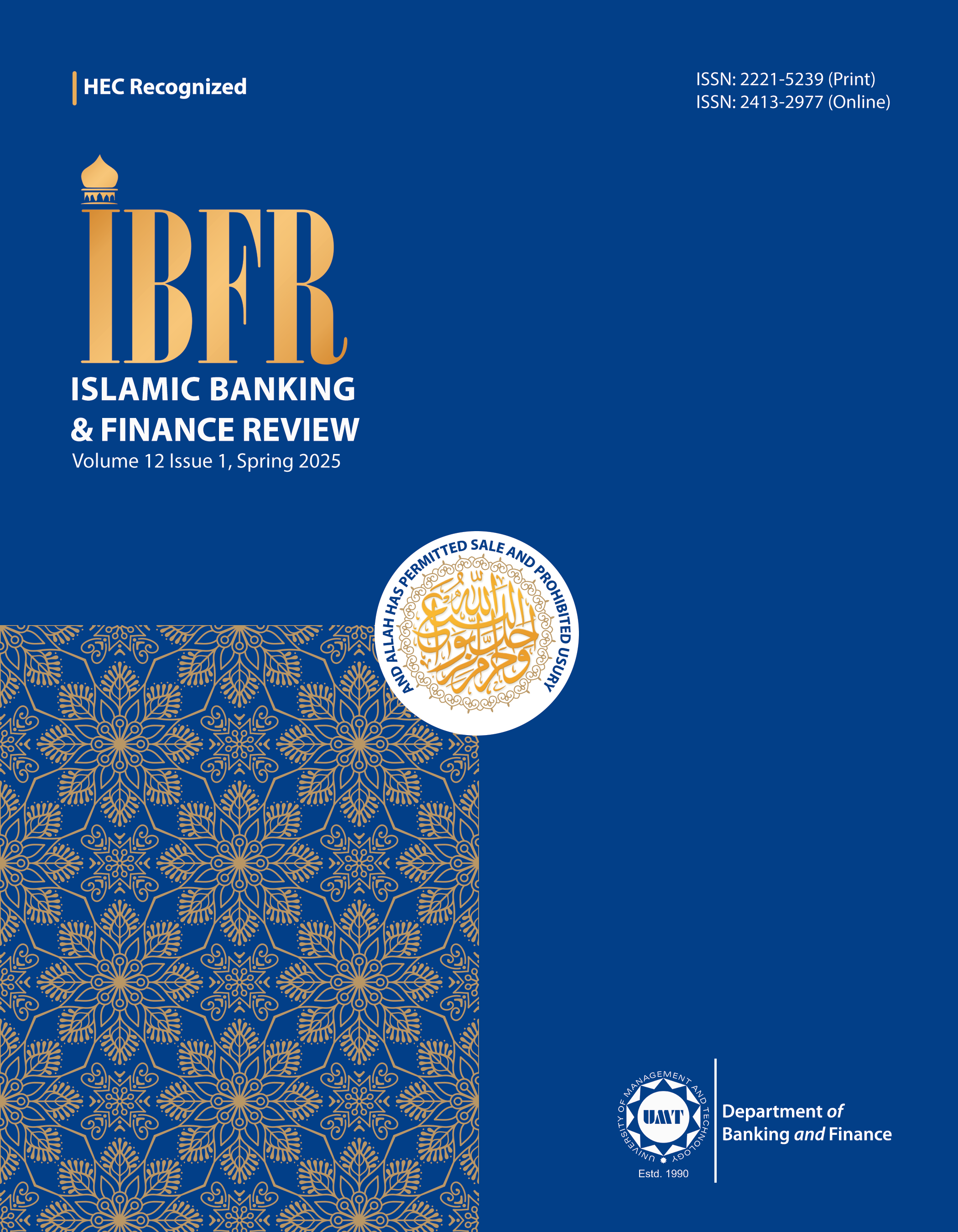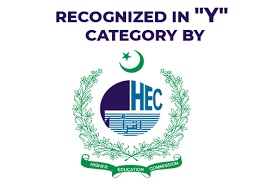Islamization of Banks in Pakistan: A review of Challenges and Prospects
Abstract
 Abstract Views: 0
Abstract Views: 0
Islamic finance has emerged as an important research area for the past few decades especially
across the Muslim-majority countries. Pakistan has experienced major transitions towards
adoption of a fully Shariah-compliant financial system. The transition also includes changes in
regulatory framework. Since the independence of Pakistan, it was clearly described in the
objectives of the country that laws would be made in the light of Shariah principles. Efforts to
Islamize the banking sector can be traced back to the very first constitutional workings under the
Objective Resolution of 1949 to the 26th amendment in the Constitution of 1973 in 2024.
Moreover, potential challenges faced by Islamic Banks in Pakistan in the context of social,
economic and religious consequences have also been examined extensively by prior studies. This
paper aims to provides multiple guidelines by offering a comprehensive review about the
regulatory, social, economic and religious consequences of Shariah compliant banking in Pakistan.
For this purpose, the constitutional documents and research papers published in peer review
journals are reviewed by applying the SPAR-4 literature review methodology. This paper has
several valuable theoretical and practical implications as well as research directions for future
studies in this field.
Downloads
References
Accounting and Auditing Organization for Islamic Financial Institutions. (2017). Sharia’ah standards. https://aaoifi.com/shariaa-standards/?lang=en
Ahmad, A. (2023). Financial innovation and corporate governance for sustainability of Islamic financial institutions: Challenges & prospects. Contemporary Issues in Social Sciences and Management Practices, 2(3), 31–41. https://doi.org/10.61503/cissmp.v2i3.50
Ahmad, A., Awan, R., & Malik, M. (2011). An overview of the operations/products offered by Islamic banks in Pakistan. African Journal of Business Management, 5(11), 4185–4190. https://doi.org/10.5897/AJBM10.724
Ahmad, A., Sohail, A., & Hussain, A. (2021). Emergence of financial technology in islamic banking industry and its influence on bank performance in Covid-19 scenario: A case of developing economy. Gomal University Journal of Research, 37(1), 97–109. https://doi.org/10.51380/gujr-37-01-09
Akbar, M., Akbar, A., Yaqoob, H. S., Hussain, A., Svobodová, L., & Yasmin, F. (2023). Islamic finance education: Current state and challenges for Pakistan. Cogent Economics and Finance, 11(1), Article e2164665. https://doi.org/10.1080/23322039.2022.2164665
Akhtar, M. F., Ali, K., & Sadaqat, S. (2011). Factors influencing the profitability of Islamic banks of Pakistan. International Research Journal of Finance and Economics, 66(66), 125–132.
Ali, M., Raza, S. A., Puah, C. H., & Mubarik, M. S. (2023). Customer acceptance toward Islamic personal financing in Pakistan. Journal of Financial Services Marketing, 28(2), 270–284. https://doi.org/10.1057/s41264-022-00149-w
Awan, A. G., & Azhar, M. (2014). Consumer behaviour towards Islamic banking in Pakistan. European Journal of Accounting Auditing and Finance Research, 2(9), 42–65.
Bhatti, M., Saleem, M. S., & Mansor, F. (2024). Need for reform in AAOIFI standards on murabaha financing: evidence from Islamic Banks in Pakistan. Quality & Quantity, 59(Suppl 1), 59–78. https://doi.org/10.1007/s11135-024-01974-y
Farooq, U., & Zafar, M. B. (2024). Development of Shariah standards in Pakistan and role of the AAOIFI: A comprehensive review and future prospects. COMSATS Journal of Islamic Finance, 9(1). https://doi.org/10.26652/cjif.9202411
Federal Shariat Court. (2022). Case flow management system. https://www.federalshariatcourt.gov.pk/Judgments/Riba.pdf
Haris, M., Yao, H. X., Tariq, G., Malik, A., & Javaid, H. M. (2019). Intellectual capital performance and profitability of banks: Evidence from Pakistan. Journal of Risk and Financial Management, 12(2), Article e56. https://doi.org/10.3390/jrfm12020056
Hussain, A., Khan, M., Rehman, A., Sahib Zada, S., Malik, S., Khattak, A., & Khan, H. (2021). Determinants of Islamic social reporting in Islamic banks of Pakistan. International Journal of Law and Management, 63(1), 1–15. https://doi.org/10.1108/IJLMA-02-2020-0060
Khan, M. M, & Bhatti, M. I. (2008). Development in Islamic banking: A financial risk‐allocation approach. The Journal of Risk Finance, 9(1), 40–51.
Murad, H., Babar Ali, S., Baig, U., Raza, A., Shahan Ali, S., & Abdullah, A. (2021). Comparative study: Conventional and Islamic banking performance in Pakistan. International Journal of Management, 12(3), 448–459. https://doi.org/10.34218/IJM.12.3.2021.042
Paul, J., Lim, W. M., O’Cass, A., Hao, A. W., & Bresciani, S. (2021). Scientific procedures and rationales for systematic literature reviews (SPAR-4-SLR). International Journal of Consumer Studies, 45(4), O1–O16. https://doi.org/10.1111/ijcs.12695
Rashid, A., & Jabeen, S. (2016). Analyzing performance determinants: Conventional versus Islamic Banks in Pakistan. Borsa Istanbul Review, 16(2), 92–107. https://doi.org/10.1016/j.bir.2016.03.002
Sadiq, M. N., Ashfaq Ahmad, U. B., & Raza, M. (2023). Islamic fintech ecosystem development in Pakistan : A meta analysis. Journal of Asian Development Studies, 12(4), 832–857. https://doi.org/10.62345/jads.2023.12.4.66
Samad, A. (2024). Islamic banking and finance. Islamic Business Administration, 1, 227–248. https://doi.org/10.5040/9781350493506.ch-012
Shaikh, S. A. (2023). Market development of Islamic banking in Pakistan and its economic impact. Journal of Islamic Accounting and Business Research, 16(1), 53–74. https://doi.org/10.1108/JIABR-02-2022-0028
Siswanti, I., Sharif, S. M., & Indrajaya, S. (2021). The role of corporate social responsibility and sharia compliance on Islamic banks performance in Indonesia and Malaysia. The Journal of Asian Finance, Economics and Business, 8(6), 983–992. https://doi.org/10.13106/jafeb.2021.vol8.no6.0983
State Bank of Pakistan. (2003). Policies for promotion of Islamic banking. https://www.sbp.org.pk/departments/ibd/Policies.pdf
State Bank of Pakistan. (2010). Adoption of Shariah standards issued by Accounting and Auditing Organization for Islamic Financial Institutions (AAOIFI). https://www.sbp.org.pk/ibd/2010/c1.htm
State Bank of Pakistan. (2008). Instructions for Shariah compliance in Islamic banking institutions. https://www.sbp.org.pk/ibd/2008/Annex-c2-1.pdf
State Bank of Pakistan. (2024). Compendium of Shariah Standards Adopted by the State Bank of Pakistan. https://www.sbp.org.pk/ifpd/2024/C7-Annex.pdf
Zafar, M. B., & Sulaiman, A. A. (2020). Islamic banking in Pakistan: Emergence, growth, and prospects. In A. Rafay (Ed.), Growth and emerging prospects of international Islamic banking (pp. 61–77). IGI Blobal.
Zulkhibri, M., & Manap, T. A. A. (Eds.). (2019). Islamic finance, risk-sharing and macroeconomic stability. Springer International Publishing.
Copyright (c) 2025 Wassaf Latif, Ashfaq Ahmad

This work is licensed under a Creative Commons Attribution 4.0 International License.
Authors retain copyright and grant the journal right of first publication with the work simultaneously licensed under a Creative Commons Attribution (CC-BY) 4.0 License that allows others to share the work with an acknowledgement of the work’s authorship and initial publication in this journal.












